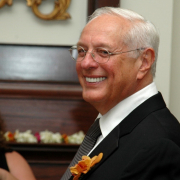Remembering Joe Salamone
Remembering Joe Salamone
By Tony Mikos, Rice University
The Biomaterials community sadly acknowledges the passing of Dr. Joseph C. Salamone, the outstanding pioneer of ophthalmologic and wound healing applications of gas-permeable polymeric materials.
Dr. Salamone first revolutionized the understanding and progress of these fields when he harnessed an expertise in polymer chemistry and imaginative synthetic chemistry techniques to invent oxygen-permeable rigid contact lenses in the late 1970s. By co-founding the Polymer Technology Corporation and Rochal Industries (the latter named for his three children), he then crucially enabled the commercialization of these products, along with more than 40 additional products ranging from intraocular lenses and ophthalmologic cleaning solutions to spray-on liquid bandages for dermatologic wounds. The holder of more than 200 U.S. patents and 800 international patents, Dr. Salamone was recognized by our Society for his far-reaching contributions and tangible impact on human healthcare with the Clemson Award for Applied Biomaterials in 2006 and the Technology, Innovation and Development Award in 2016.
In addition to his participation in the Society For Biomaterials (SFB) Special Interest Group for Tissue Engineering, Dr. Salamone was a Member of the National Academy of Engineering and National Academy of Inventors. He also served as an active Fellow of the American Chemical Society Division of Polymer Chemistry, as well as the Industry Council of the American Institute for Medical and Biological Engineering. Known as a riveting lecturer and one who readily encouraged early-career faculty towards their own research initiatives, Dr. Salamone has also been associated with many educational institutions, serving as Dean for the University of Massachusetts Lowell. Providing an unmatched example of developing a biomedical technology from conception to realization, his life’s work of translating insight in material chemistry has benefited the sight of innumerable patients.


